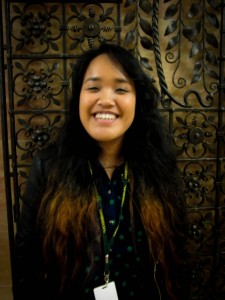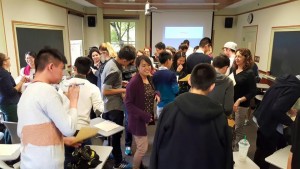 Emily Letcher is from the Eugene area and is an alumnus of both the University of Oregon and the Second Language Acquisition & Teaching (SLAT) certificate program. This Fall she will begin teaching in Bangkok, Thailand.
Emily Letcher is from the Eugene area and is an alumnus of both the University of Oregon and the Second Language Acquisition & Teaching (SLAT) certificate program. This Fall she will begin teaching in Bangkok, Thailand.
What is the title of your MA project?
Teaching Interlanguage Pragmatics of Disagreement in a Secondary EFL Context Using Film and TV Shows
Why did you choose this topic?
I am very passionate about the study and use of critical thinking, logic and argumentation, both as a personal interest and also as a skill that I think ought to be taught. Before I began the LTS program, I had recently returned from Italy, where I was teaching debate in several of my high school conversation classes. That wonderful experience, and the students themselves, impressed upon me just how capable and enthusiastic our young adult students are at voicing their different beliefs and tackling contemporary issues. I don’t just want students to be able to express their opinions behind a podium though, I want them to be able to do so interpersonally, at an everyday, conversational level, and even when their opinion differs from the other person’s.
Of course, students do this in their own language already, but trying to disagree in a foreign language, with speakers of that language, opens up a whole new can of worms. There are so many sociocultural factors that go into deciding how to say what you say in order to have successful communication. Were you polite? Were you too direct? The quality of the argument you put forth won’t matter as much if you are not aware of these unwritten “rules” that are shared and understood by people from that language culture. I developed this project in order to provide concrete ways to help students recognize these pragmatic issues and choose how to respond to them, so that they will hopefully be able to more confidently and successfully express themselves in English.
What do you like best about your project?
My project uses film and TV shows as the main method to teaching students about disagreement.
Films and TV shows are very important to me because of how they reflect our perceptions of reality and also project our ideals for it. They may not always be very academic, but I think they have the potential to reach and connect more people than anything else does, and that makes them invaluable. I could say so much more but I will simply say that I am very happy to be able to incorporate this huge part of my life into my project.
What advice would you give to future students about the MA project?
Choose something that you are passionate about, not because you’ll be spending every waking hour thinking about it, which you will, but because this is one of the best opportunities for you to learn more about something specific that interests you and to apply it in a way that is meaningful not just for you but for a whole audience. As a teacher, you will always be in a position to influence and inspire students. Regardless of whether you use this project with your students though, this is an immediate, tangible opportunity for you to also influence and inspire your current and future colleagues and possibly even the academic field. I have been inspired by all my cohort members’ work and am very proud to be graduating with them.
